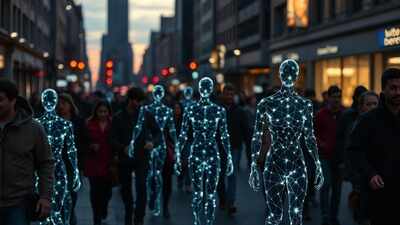Instant scholar: Societies of control – Understanding Gilles Deleuze’s vision of contemporary power

Gilles Deleuze’s 1990 essay “Postscript on the Societies of Control” stands as a prophetic and unsettling reflection on how power operates in contemporary society. Written shortly after the death of his philosophical collaborator Félix Guattari and amid a rapidly globalising, digitalising world, the essay is short yet profound. Building on Michel Foucault’s concept of disciplinary societies, Deleuze proposes a shift to a new paradigm: the society of control. In this vision, power no longer operates through confinement and institution-building (as in schools, prisons, and factories) but through continuous modulation, flexibility, and the management of flows—of information, bodies, and behaviours.
From Discipline to Control: The Evolution of Power
Deleuze begins by acknowledging Michel Foucault’s well-known analysis of power in modernity. Foucault famously argued that modern societies were disciplinary societies—systems that governed people by confining them in institutions such as schools, factories, barracks, and prisons. Each institution shaped individuals in specific ways, subjecting them to surveillance and training to make them productive and docile. Power was exercised through clear boundaries, spatial confinement, and rules. Deleuze writes, however, that we are now leaving the disciplinary societies and entering a new historical formation—the society of control. In these emerging societies, individuals are no longer moulded in discrete spaces but are constantly shaped by ongoing processes of modulation. In his own words: “We are in a generalised crisis in relation to all the environments of enclosure—prison, hospital, factory, school, family.” Control societies don’t rely on rigid structures or borders. Instead, they use technology, algorithms, and networks to govern behaviour dynamically and in real time. Whereas discipline confined bodies in time and space, control disperses them across networks of communication and consumption.
Modulation over Moulding
One of the most striking metaphors Deleuze uses is that of moulding versus modulation. In disciplinary societies, individuals are shaped like objects cast in a mould—once and for all. In societies of control, however, power operates like a modulation: constantly adjusting, adapting, and reshaping the individual based on real-time feedback. For instance, in a factory-based economy, a worker might clock in, perform a set task, and go home. In the gig economy—a prime example of control society dynamics—the worker is constantly monitored, evaluated, and ranked. Algorithms can suspend, promote, or change their access to work instantaneously. They are not confined but are subjected to continuous modulation. In Deleuze’s words: “Enclosures are moulds, distinct castings, but controls are a modulation, like a self-transmuting moulding continually changing from one moment to the next…” This shift has immense implications: it means that control is no longer primarily about keeping people in or out, but about managing and guiding them as they move, communicate, and live.
The Rise of “Dividuals”
One of Deleuze’s most prescient ideas is his distinction between the individual of disciplinary society and the dividual of control society. In the past, individuals were treated as whole persons with relatively stable identities. Today, however, digital technologies fragment us into dividuals—data points, behavioural patterns, consumption habits, genetic codes, credit scores, GPS traces, and so on. This fragmentation allows power to operate in far more granular ways. Governments, corporations, and institutions no longer deal with people as holistic subjects, but as modulated sets of traits that can be calculated, targeted, predicted, or excluded. Creditworthiness, for example, is no longer just about who you are, but how your data self behaves in comparison to patterns across vast databases. Social media platforms continuously shape your preferences, interactions, and emotions through algorithmic nudges. This is dividualisation: the atomisation of identity into quantifiable fragments.
The Role of Technology and Capital
Deleuze was writing in the early 1990s, but his essay anticipated the rise of Big Data, algorithmic governance, and platform capitalism. In control societies, power is not merely political or bureaucratic—it is inseparable from capital and code. The corporation becomes a central actor in governing life, and control is embedded in the very tools we use to live, work, and communicate. He writes: “The corporation has replaced the factory, and the corporation is a spirit, a gas.” Unlike the factory, which had physical walls and rules, the corporation is often intangible, dispersed, and constantly adapting. It infiltrates our daily life—through credit cards, apps, tracking systems, biometric scanners, recommendation engines—and shapes behaviour invisibly. Control society is thus inseparable from neoliberal capitalism, which seeks to maximise profit not by rigid discipline but by extracting value from every aspect of life: emotions, leisure, health, and attention. Here, even resistance can be commodified and fed back into the system as “innovation” or “user feedback.”
Education, Work, and Health in the Control Society
Deleuze also notes how core aspects of social life—education, work, and health—are transformed in the control society. For example, instead of attending a single educational institution with defined stages and exams, lifelong learning is now the norm, with certifications, training modules, and performance metrics spread across a person’s life. Continuous self-improvement becomes a requirement rather than a choice. Similarly, employment becomes a matter of continuous assessment and flexibility. Workers must constantly update skills, adapt to platforms, and market themselves. This is no longer the factory model but a fluid, precarious arrangement governed by digital feedback and risk calculation. Healthcare, too, shifts from episodic care to permanent monitoring. Wearables, biometric tracking, and predictive health analytics aim not to cure but to prevent—and in doing so, render the body into a site of permanent optimisation.
Resistance in a World of Control
Can there be resistance in a society of control? Deleuze is cautious but not entirely pessimistic. He writes: “There is no need to fear or hope, but only to look for new weapons.” While surveillance and algorithmic power seem all-encompassing, Deleuze’s remark suggests that resistance must be rethought—not as escape from institutions, but as interventions within and across networks. Activism, encryption, data rights, open-source technologies, and acts of refusal are some examples. Control does not mean total domination—it means new forms of negotiation, conflict, and creativity. The task, for Deleuze, is to understand how control works in order to find ways of subverting or redirecting it.
A Philosophy Ahead of Its Time
Gilles Deleuze’s Postscript on the Societies of Control is less a blueprint than a diagnosis—a philosophical reflection on emerging conditions of power. With astonishing clarity, it anticipated the rise of digital capitalism, algorithmic governmentality, and the fragmentation of the self into data points. By contrasting the disciplinary societies of the 18th to 20th centuries with the control societies of today, Deleuze offers a framework for understanding how power adapts in fluid, decentralised ways. His concepts of modulation, dividuals, and the corporate spirit have become even more relevant in the era of smartphones, cloud computing, and AI surveillance. Ultimately, Deleuze challenges us to move beyond nostalgia for older forms of power and to grapple with the new logics that govern our present and shape our future.
Postscript on the Societies of Control – Gilles Deleuze
‘Instant Scholar’ is a Times of India initiative to make academic research accessible to a wider audience. If you are a Ph.D. scholar and would like to publish a summary of your research in this section, please share a summary and authorisation to publish it. For submission, and any question on this initiative, write to us at instantscholar@timesgroup.com




